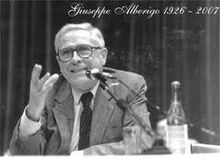Giuseppe Alberigo
Giuseppe Alberigo (born January 21, 1926 in Varese ; † June 15, 2007 in Bologna ) was an Italian lawyer and Roman Catholic church historian.
Vita
Giuseppe Alberigo came from a relatively simple background. In 1943 he fled to Switzerland to avoid military service. After passing the Abitur in 1944, he enrolled at the Catholic University of Milan . In 1948 he received his doctorate in law and then worked as a research assistant at the Centro di documentazione in Bologna . He researched legal and church history. In 1951 he was appointed professor at the University of Modena . In 1954 he went to the University of Florence , where he worked until 1967.
After Alberigo had also become head of the Istituto per le scienze religious in Bologna in 1962 , he received a call to the Chair of Church History at the University of Bologna in 1967. Alberigo had qualified for this role through a study on the Council of Trento , which he carried out during a two-year research stay with Hubert Jedin at the University of Bonn .
In 1999 Alberigo received an honorary doctorate from the Catholic Theological Faculty of the Westphalian Wilhelms University in Münster . In 2002 the Catholic Theological Faculty of the Julius Maximilian University of Würzburg awarded him an honorary doctorate.
For a long time he was a member of the management committee of the theological journal Concilium (other editorial members e.g. Hans Küng , Karl Rahner ).
Alberigo died of a stroke in June 2007 from April of that year.
Work and action
Giuseppe Alberigo became known worldwide through his studies for the Second Vatican Council , especially through the five-volume history of this church assembly published by him from 1995 to 2001. A German translation will appear from the year 2000. There are translations into numerous other languages.
Alberigo particularly emphasized the aspect of the rupture that had shaped Vatican II. It is therefore important to work in this “spirit of the council” on a further and progressive renewal of the church (so-called “hermeneutics of the break”). He tends to place this “spirit” above the wording of the Council documents. In contrast, critics of Alberigo advocate a hermeneutic of continuity, which refers to the fact that the Council wanted to preserve the historical connection with tradition and that therefore the further development of the church must include the entire tradition in theological reflection. Alberigo also wrote several studies on the work of Pope John XXIII. He was the author and editor of numerous other books and articles.
Rating
Due to his publications, Alberigo acquired the reputation of a leading historian of the Second Vatican Council in some research circles. In the most recent dispute about the hermeneutics of this council, however, critical evaluations of Alberigo's interpretation of church history were also expressed, especially by Walter Brandmüller , the editor of the almost forty-volume series of the history of the council, and by the Italian medievalists Claudio Leonardi and Girolamo Arnaldi .
Works
Selection of works that are available in German translation:
- History of the Second Vatican Council (1959-1965). 5 volumes, Mainz 2000–2007.
- Johannes XXIII., Life and Work of the Council Pope , Matthias-Grünewald-Verlag, Mainz 2000, ISBN 3-7867-2288-9 .
- as editor: Storia dei concilii ecumenici . Editori Queriniana, Brescia 1990.
- German, as a licensed edition: History of the Councils from the Nicaenum to the Vaticanum II. Fourier, Wiesbaden 1998, ISBN 3-932412-02-8 .
- Decrees of the Ecumenical Councils. 3 volumes, Paderborn 2000–2002.
- Open the windows. The adventure of the Second Vatican Council. Zurich 2006.
Remarks
- ↑ See the obituary by Alberto Melloni in The Catholic Historical Review, Vol. 93, no. 4th
- ^ Giuseppe Alberigo in Dizionario Biografico degli Italiani
- ↑ See the bibliographical list of the complete works in http://www.uni-bamberg.de/kgpatr/leistungen-organisationsebene-universitaet/forschung/konzilienforschung/konziliengeschichte/ .
- ↑ Cf. Armin Schwibach : The essence of the church is ideologically distorted. The “Decrees of the Ecumenical and General Councils” in a questionable new edition . In: Die Tagespost , June 19, 2007, p. 10.
| personal data | |
|---|---|
| SURNAME | Alberigo, Giuseppe |
| ALTERNATIVE NAMES | Alberigo, Pino |
| BRIEF DESCRIPTION | Italian theologian and church historian |
| DATE OF BIRTH | January 21, 1926 |
| PLACE OF BIRTH | Varese |
| DATE OF DEATH | June 15, 2007 |
| Place of death | Rome |
